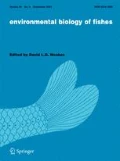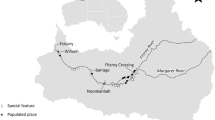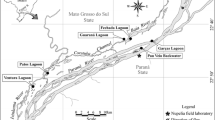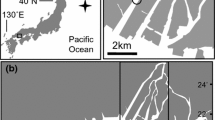Abstract
Knowledge of the biology of native fishes of the Murray-Darling Basin is based largely on studies conducted under hatchery conditions and on a limited number of recreationally important species. From observations that increases in water level in aquaculture ponds initiate spawning in some species, and from limited studies of wild fishes and studies in overseas floodplain river systems, a perception has emerged of the importance of flooding and the flood plain in the life cycles of Murray-Darling fishes in general. However, there is little confirmatory evidence of the use of temporary floodplain habitats by larvae, juveniles or adults. The significance of in-channel habitats, especially for rearing, has received little attention. Murray-Darling fish species can be placed into three life history modes, based mainly on spawning style and time and developmental intervals of larvae at first feeding. Fish in each group may be able to take advantage of floods if the timing is right and prey are plentiful, however, the larvae of some species are able to recruit under non-flood conditions within the main river channel. This forms the basis of the ‘low flow recruitment hypothesis’, which attempts to explain why some species spawn during the warmest months and lowest flows and how they are able to recruit under these conditions. This hypothesis is then placed in the context of the current state of knowledge of the relationships between flow and the biology of Murray-Darling fishes, specifically cues for spawning, movement and recruitment. The lack of widespread evidence for floodplain use by any life history interval of fish may be due to a paucity of study, however, there are some fundamental factors, such as the predictability of timing and duration of high flow events as well as the lack of coincidence of high flows and high temperatures in some regions of the Basin, which may be important in determining the use of floodplain habitats by fish.
Similar content being viewed by others
References cited
Allen, G.R. 1989. Freshwater fishes of Australia. T.F.H. Publications, Neptune City. 240 pp.
Almeida, R.G. 1980. Aspectos taxonomicoa e habitos alimentares de tres especies de Triportheus (Pisces: Characoidei, Characidae), do lago do Castanho, Amazonas. M.S. Thesis, Instituto Nacional de Pesquisas da Amazonia, Manaus. 104 pp. (cited in: Junk, W.J., PB. Bayley & RE. Sparks. 1989. The flood pulse concept in river-floodplain systems. Can. Sp. Publ. Fish. Aquat. Sci. 106: 110–127).
Anderson, J.R., J.S. Lake & N.J. Mackay. 1991. Notes on reproductive behaviour and ontogeny in two species of Hypseleotris (=Carassiops) (Gobiidae: Teleostei). Aust. J. Mar. Freshw. Res. 22: 139–145.
Arumugam, P.T. & M.C. Geddes. 1987. Feeding and growth of golden perch larvae and fry (Macquaria ambigua Richardson). Trans. Roy. Soc. S. Aust. 111: 59–65.
Balon, E.K. 1984. Patterns in the evolution of reproductive styles in fishes. pp. 35–52. In: G.W. Potts & R.J. Wootton (ed.) Fish Reproduction: Strategies and Tactics, Academic Press, London.
Basu, B.K. & F.R. Pick. 1996. Factors regulating phytoplankton and zooplankton biomass in temperate rivers. Limnol. Oceanogr. 41: 1572–1577.
Basu, B.K. & F.R. Pick. 1997. Phytoplankton and zooplankton development in a lowland, temperate river. J. Plank. Res. 19: 237–253.
Bayley, P.B. 1981. Fish yield from the Amazon in Brazil: comparison with African river yields and management possibilities. Trans. Amer. Fish. Soc. 110: 351–359.
Bayley, P.B. 1983. Central Amazon fish populations. Biomass, production and some dynamic characteristics. Ph.D. Thesis, Dalhousie University, Halifax. 330 pp. (cited in: R.L. Welcomme 1985. River fisheries. Food and Agriculture Organization of the United Nations, FAO Fisheries Technical Paper 262).
Bayley, P.B. 1988a. Factors affecting growth rates of young tropical floodplain fishes: seasonality and density-dependence. Env. Biol. Fish. 21: 127–142.
Bayley, P.B. 1988b. Understanding large river-floodplain ecosystems. BioScience 45: 153–158.
Backhouse, G.N. & D.J. Frusher. 1980. The crimson-spotted rainbowfish, Melanotaenia fluviatilis (Castelnau 1878). Vict. Nat. 97: 144–148.
Beumer, J.P. 1979. Reproductive cycles of two Australian freshwater fishes: the spangled perch, Therapon unicolor Gűnther, 1859 and the East Queensland rainbowfish, Nematocentris splendida Peters, 1866. J. Fish Biol. 15: 111–134.
Bone, Q., N.B. Marshall & J.H.S. Blaxter. 1995. Biology of fishes, 2nd edition. Blackie Academic and Professional Publishers, Glasgow. 332 pp.
Bonetto, A.A., W. Dioni & C. Pignalberi. 1969. Limnological investigations on biotic communities in the middle Parana river valley. Verh. int. Ver. theor. angew. Limnol. 17: 1035–1050.
Boulton, A.J. & L.N. Lloyd. 1992. Flooding frequency and invertebrate emergence from dry floodplain sediments of the River Murray, Australia. Regul. Riv. 7: 137–151.
Bowen, S.H. 1984. Detritivory in neotropical fish communities. pp. 59–66. In: T. Zaret (ed.) Evolutionary Ecology of Neotropical Freshwater Fishes, Dr W. Junk Publishers, The Hague.
Bremigan, M.T. & R.A. Stein. 1994. Gape-dependent larval foraging and zooplankton size: implications for fish recruitment across systems. Can. J. Fish. Aquat. Sci. 51: 913–922.
Butler, J.L. & D. Pickett. 1988. Age-specific vulnerability of Pacific sardine, Sardinops sagax, larvae to predation by northern anchovy, Engraulis mordax. U.S. Fish. Bull. 86: 163.
Bye, V.C. 1984. The role of environmental factors in the timing of reproductive cycles. pp. 187–206. In: G.W. Potts & R.J. Wootton (ed.) Fish Reproduction: Strategies and Tactics, Academic Press, London.
Cadwallader, P.L. 1978. Some causes of the decline in range and abundance of native fish in the Murray-Darling river system. Proc. Roy. Soc. Vict. 90: 211–224.
Cadwallader, P.L. & G.N. Backhouse. 1983. A guide to the freshwater fish of Victoria. Victorian Government Printing Office, Melbourne. 249 pp.
Cadwallader, P.L., G.N. Backhouse, G.J. Gooley & J.A. Turner. 1979. New techniques for breeding and raising Murray cod. Aust. Fish. 38: 9–16.
Cadwallader, P.L., A.K. Eden & R.A. Hook. 1980. Role of stream-side vegetation as a food source for Galaxias olidus Gunther (Pisces: Galaxiidae). Aust. J. Mar. Freshw. Res. 31: 257–262.
Cadwallader, P.L. & B. Lawrence. 1990. Chapter 22: Fish. pp. 317–363. In: N. Mackay & D. Eastburn (ed.) The Murray, Murray Darling Basin Commission, Canberra.
Cadwallader, P.L. & P.L. Rogan. 1977. The Macquarie perch, Macquaria australasica (Pisces: Percichthyidae) of Lake Eildon, Victoria. Aust. J. Ecol. 2: 409–418.
Copp, G.H. 1992. Comparative microhabitat use of cyprinid larvae and juveniles in a lotic floodplain channel. Env. Biol. Fish. 33: 181–193.
Crome, F.H.J. 1986. Australian waterfowl do not necessarily breed on a rising water level. Aust. Wildl. Res. 13: 461–480.
Crome, F.H.J. & S.M. Carpenter. 1988. Plankton community cycling and recovery after drought — dynamics in a basin on a flood plain. Hydrobiologia 164: 193–211.
Cushing, D.H. 1990. Plankton production and year-class strength in fish populaions: an update of the match/mismatch hypothesis. Adv. Mar. Biol. 26: 249–293.
Davies, BR. & K.F. Walker. 1986. The ecology of river systems, Dr W. Junk Publishers, Dordrecht. 793 pp.
Davis, T.L.O. 1977. Reproductive biology of the freshwater catfish, Tandanus tandanus Mitchell, in the Gwydir River, Australia. II. Gonadal cycle and fecundity. Aust. J. Mar. Freshw. Res. 28: 159–169.
de Vlaming, V.L. 1972. Environmental control of teleost reproductive cycles: a brief review. J. Fish Biol. 4: 131–140.
Ferrari, I., A. Farabegoli & R. Mazzoni. 1989. Abundance and diversity of planktonic rotifers in the Po River. Hydrobiologia 186/187: 201–208.
Finger, T.R. & E.M. Stewart. 1987. Response of fishes to flooding regime in lowland hardwood wetlands. pp. 86–92. In: W.J. Matthews & D.C. Heins (ed.) Community and Evolutionary Ecology of North American Stream Fishes, University of Oklahoma Press, Norman.
Frank, K.T. 1988. Independent distributions of fish larvae and their prey: natural paradox or sampling artifact? Can. J. Fish. Aquat. Sci. 45: 48–59.
Fuiman, L.A. 1989. Vulnerability of Atlantic herring larvae to predation by yearling herring. Mar. Ecol. Prog. Ser. 51: 291–299.
Gehrke, P.C. 1990a. Spatial and temporal dispersion patterns of golden perch, Macquaria ambigua, larvae in an artificial floodplain environment. J. Fish Biol. 37: 225–236.
Gehrke, P.C. 1990b. Clinotactic responses of larval silver perch (Bidyanus bidyanus) and golden perch (Macquaria ambigua) to simulated environmental gradients. Aust. J. Mar. Freshw. Res. 41: 523–528.
Gehrke, P.C. 1991. Avoidance of inundated floodplain habitat by larvae of golden perch (Macquaria ambigua Richardson): influence of water quality or food distribution? Aust. J. Mar. Freshw. Res. 42: 707–719.
Gehrke, P.C. 1992. Diel abundance, migration and feeding of fish larvae (Eleotridae) in a floodplain billabong. J. Fish Biol. 40: 695–707.
Gehrke, P.C. 1994. Influence of light intensity and wavelength on phototactic behaviour of larval silver perch Bidyanus bidyanus and golden perch Macquaria ambigua and the effectiveness of light traps. J. Fish Biol. 44, 741–751.
Gehrke, P.C., M.B. Revell & A.W. Philby. 1993. Effects of river red gum, Eucalyptus camaldulensis, litter on golden perch, Macquaria ambigua. J. Fish Biol. 43: 265–279.
Gotceitas, V., V. Puvanendran, L.L. Leader & J.A. Brown. 1996. An experimental investigation of the ‘match/mismatch’ hypothesis using larval Atlantic cod. Mar. Ecol. Prog. Ser. 130: 29–37.
Goulding, M. 1980. The fishes and the forest. Explorations in Amazonian natural history. University of California Press, Berkeley. 280 pp.
Goulding, M. 1981. Man and fisheries on an Amazonian frontier. Dr W. Junk Publishers, The Hague. 137 pp.
Harris, J.H. 1984. Zoogeography of the Australian freshwater fish fauna. pp. 211–222. In: M. Archer & G. Clayton (ed.) Vertebrate Zoogeography and Evolution in Australasia, Hesperian Press, Perth.
Harris, J.H. & P.C. Gehrke. 1994. Modelling the relationship between streamflow and population recruitment to manage freshwater fisheries. Aust. Fish. 6: 28–30.
Hildrew, A.G., C.R. Townsend & A. Hasham. 1985. The predatory Chironomidae of an iron-rich stream: feeding ecology and food web structure. Ecol. Entomol. 10: 403–413.
Holden, M.J. & J. Green. 1960. The hydrology and plankton of the River Sokoto. J. Anim. Ecol. 29: 65–84.
Holland, L.E., C.F. Bryan & J.P. Newman, Jr. 1983. Water quality and the rotifer population in the Atchafalaya River Basin. Hydrobiologia 98: 55–69.
Houde, E.D. 1987. Fish early life dynamics and recruitment variability. American Fisheries Society Symposium 2: 17–29.
Humphries, P. 1989. Variation in the life history of diadromus and landlocked populations of the spotted galaxias, Galaxias truttaceus Valenciennes, in Tasmania. Aust. J. Mar. Freshw. Res. 40: 501–518.
Humphries, P. 1995. Life history, food and habitat of southern pygmy perch, Nannoperca australis, in the Macquarie River, Tasmania. Mar. Freshw. Res. 46: 1159–1169.
Ingram, B.A. & J.W. Douglas. 1995. Threatened fishes of the world: Maccullochella macquariensis (Cuvier, 1829) (Percichthyidae). Env. Biol. Fish. 43: 38.
Ingram, B.A. & M.A. Rimmer. 1992. Induced breeding and larval rearing of the endangered Australian freshwater fish trout cod, Maccullochella macquariensis (Cuvier) (Percichthyidae). Aquat. Fish. Man. 24: 7–17.
Jackson, P.D. 1978. Spawning and early development of the river blackfish, Gadopsis marmoratus Richardson (Gadopsiformes: Gadopsidae), in the McKenzie River, Victoria. Aust. J. Mar. Freshw. Res. 29: 293–298.
Jobling, M. 1995. Environmental biology of fishes. Chapman & Hall Publishers, London. 455 pp.
Junk, W.J., P.B. Bayley & R.E. Sparks. 1989. The flood pulse concept in river-floodplain systems. pp. 110–127. In: D.P. Dodge (ed.) Proceedings of the International Large River Symposium, Can. Sp. Publ. Fish. Aquat. Sci. 106.
Junk, W.J., M.G.M. Soares & U. Saint-Paul. 1997. The fish. pp. 385–408. In: W.J. Junk (ed.) The Central Amazon Floodplain: Ecology of a Pulsing System, Springer-Verlag, Berlin.
Junk, W.J. & G.H. Weber. 1996. Amazonian floodplains: a limnological perspective. Verh. internat. Verein. Limnol. 26: 149–157.
Koehn, J. 1986. Approaches to determining flow and habitat requirements for native freshwater fish in Victoria. pp. 95–115. In: I.C. Campbell (ed.) Stream Protection: the Management of Rivers for Instream Uses, Water Studies Centre, Chisolm Institute Technology, Melbourne.
Koehn, J.D. & W.G. O'Connor. 1990. Biological Information for Management of Native Freshwater Fish in Victoria. Government Printer, Melbourne. 165 pp.
Lake, J.S. 1967a. Rearing experiments with five species of Australian freshwater fishes. I. Inducement to spawning. Aust. J. Mar. Freshw. Res. 18: 137–153.
Lake, J.S. 1967b. Rearing experiments with five species of Australian freshwater fishes. II. Morphogenesis and ontogeny. Aust. J. Mar. Freshw. Res. 18: 155–173.
Lake, J.S. 1971. Freshwater fishes and rivers of Australia. Thomas Nelson & Sons Ltd, Melbourne. 61 pp.
Lake, P.S. 1995. Of floods and droughts: river and stream ecosystems of Australia. pp. 659–694. In. C.E. Cushing, K.W. Cummins & G.W. Minshall (ed.) Ecosystems of the World 22, River and Stream Ecosystems, Elsevier Press, London.
Lancaster, J. & A.L. Robertson. 1995. Microcrustacean prey and macroinvertebrate predators in a stream food web. Freshw. Biol. 34: 123–134.
Lawrence, R. 1971. Habitat and economy: a historical perspective. pp. 249–261. In: D.J. Mulvaney & J. Golson (ed.) Aboriginal Man and Environment in Australia, Australian National University, Canberra.
Lightfoot, G.W. & N.V. Jones. 1996. The relationship between the size of 0+ roach, Rutilus rutilus, their swimming capabilities, and distribution in an English river. Folia Zool. 45: 355–360.
Litvak, M.K. & W.C. Leggett. 1992. Age and size-selective predation on larval fishes: the bigger-is-better hypothesis revisited. Mar. Ecol. Prog. Ser. 81: 13–24.
Llewellyn, L.C. 1968. Tagging gives answers to fish growth queries. The Fisherman, June: 1–5.
Llewellyn, L.C. 1971. Breeding studies on the freshwater forage fish of the Murray-Darling river system. The Fisherman, June: 1–12.
Llewellyn, L.C. 1973. Spawning, development and temperature tolerance of the spangled perch Madigania unicolor (Gunther) from inland waters in Australia. Aust. J. Mar. Freshw. Res. 24: 73–94.
Llewellyn, L.C. 1974. Spawning, development and distribution of the southern pygmy perch Nannoperca australis australis Gunther from inland waters in Eastern Australia. Aust. J. Mar. Freshw. Res. 25: 121–149.
Llewellyn, L.C. & M.C. MacDonald. 1980. Family Percichthyidae. Australian freshwater basses and cods. pp. 142–149. In: R.M. McDowall (ed.) Freshwater Fishes of South-eastern Australia, Reed, Sydney.
Lowe-McConnell, R.H. 1975. Fish communities in tropical freshwaters. Longman, London. 337 pp.
Mackay, N.J. 1973. Histological changes in the ovaries of the golden perch, Plectroplites ambiguus, associated with the reproductive cycle. Aust. J. Mar. Freshw. Res. 24: 95–101.
Mann, R.H.K. & J.A.B. Bass. 1997. The critical water velocities of larval roach (Rutilus rutilus) and dace (Leuciscus leuciscus) and implications for river management. Regul. Riv. 13: 295–301.
Margulies, D. 1990. Vulnerability of larval white perch, Morone americana, to fish predation. Env. Biol. Fish. 27: 187–200.
McComb, A.J. & P.S. Lake. 1990. Australian wetlands, Angus & Robertson Publishers, Sydney. 258 pp.
McDowall, R.M. & W. Fulton. 1996. Galaxiids. pp. 52–77. In: R.M. McDowall (ed.) Freshwater Fishes of South-eastern Australia, Reed, Sydney.
McKinnon, L.J. 1995. Emergence of Murray crayfish Euastacus armartus (Decapoda: Parastacidae), from the Murray River due to post flooding hypoxia. Proc. Roy. Soc. Vict. 107: 31–38.
McKinnon, L.J. & N. Shepheard. 1995. Factors contributing to a fish kill in the Broken Creek. Vic. Nat. 112: 93–99.
Merrick, J.R. & G.E. Schmida. 1984. Australian freshwater fishes: biology and management. Griffin, Adelaide. 409 pp.
Miller, T.J., L.B. Crowder, J.A. Rice & E.A. Marschall. 1988. Larval size and recruitment mechanisms in fishes: towards a conceptual framework. Can. J. Fish. Aquat. Sci. 45: 1657–1670.
Milton, D.A. & A.H. Arthington. 1984. Reproductive strategy and growth of the crimson-spotted rainbowfish, Melanotaenia splendida fluviatilis (Castelnau) (Pisces: Melanotaeniidae) in South-eastern Queensland. Aust. J. Mar. Freshw. Res. 35: 75–83.
Milton, D.A. & A.H. Arthington. 1985. Reproductive strategy and growth of the Australian smelt, Retropinna semoni (Weber) (Pisces: Retropinnidae), and the olive perchlet, Ambassis nigripinnis (De Vis) (Pisces: Ambassidae), in Brisbane, Southeastern Queensland. Aust. J. Mar. Freshw. Res. 36: 329–341.
Milward, N.E. 1969. Development of the eggs and early larvae of the Australian smelt, Retropinna semoni (Weber). Proc. Linn. Soc. NSW 90: 1–7.
Neiff, J.J. 1996. Large rivers of South America: toward the new approach. Verh. internat. Verein. Limnol. 26: 167–180.
O'Connor, W.G. & J.D. Koehn. 1991. Spawning of the mountain galaxias Galaxius olidus Gunther, in Bruce's Creek, Victoria. Proc. Roy. Soc. Vic. 103: 113–123.
Pace, M.L., S.E.G. Findlay & D. Lints. 1992. Zooplankton in advective environments: the Hudson River community and a comparative analysis. Can. J. Fish. Aquat. Sci. 49: 1060–1069.
Pepin, P. & T.H. Shears. 1995. Influence of body size and alternate prey abundance on the risk of predation to fish larvae. Mar. Ecol. Prog. Ser. 128: 279–285.
Perlmutter, D.G. & J.L. Meyer. 1991. The impact of a streamdwelling harpacticoid copepod upon detritally associated bacteria. Ecology 71: 2170–2180.
Poff, N.L. & J.V. Ward. 1989. Implications of streamflow variability and predictability for lotic community structure: a regional analysis of streamflow patterns. Can. J. Fish. Aquat. Sci. 46: 1805–1818.
Puckridge, J.T. & K.F. Walker. 1990. Reproductive biology and larval development of a gizzard shad, Nematalosa erebi (Gunther) (Dorosomatinae: Teleostei), in the River Murray, South Australia. Aust. J. Mar. Freshw. Res. 41: 695–712.
Puckridge, J.T., F. Sheldon, K.F. Walker & A.J. Boulton. 1998. Flow variability and the ecology of large rivers. Mar. Freshw. Res. 49: 55–72.
Reid, H.P. & D.A. Holdway. 1995. Early development of the Australian crimson-spotted rainbowfish, Melanotaenia fluviatilis (Pisces: Melanotaeniidae). Mar. Freshw. Res. 46: 475–480.
Reynolds, L.F. 1983. Migration patterns of five fish species in the Murray-Darling river system. Aust. J. Mar. Freshw. Res. 34: 857–871.
Richter, B.D., J.V. Baumgartner, J. Powell & D.P. Braun. 1996. A method for assessing hydrologic alteration within ecosystems. Cons. Biol. 10: 1163–1174.
Roberts, J. & G. Sainty. 1996. Listening to the Lachlan. Sainty & Associates, Potts Point. 101 pp.
Roberts, T.R. 1973. Ecology of fishes in the Amazon and Congo basins. pp. 239–254. In: B.J. Meggers & E.S. Ayers (ed.) Tropical Forest Ecosystems in Africa and South America: a Comparative Review, Smithsonian Institution Press, Washington, D.C.
Robertson, A.L. 1990. The population dynamics of Chydoridae and Macrothicidae (Cladocera: Crustacea) from the River Thames, UK. Freshw. Biol. 24: 375–389.
Robertson, A.L. 1995. Secondary production of a community of benthic Chydoridae (Cladocera: Crustacea) in a large river, UK. Arch. Hydrobiol. 134: 425–440.
Rowland, S.J. 1983 Spawning of the Australian freshwater fish Murray cod, Maccullochella peeli (Mitchell), in earthen ponds. J. Fish Biol. 23: 525–534.
Rowland, S.J. 1989. Aspects of the history and fishery of the Murray cod, Maccullochella peeli (Mitchell) (Percichthyidae). Proc. Linn. Soc. NSW 111: 201–203.
Rowland, S.J. 1992. Diet and feeding of Murray cod (Maccullochella peeli) larvae. Proc. Linn. Soc. NSW 113: 193–201.
Rundle, S.D. & A.G. Hildrew. 1992. Small fish and small prey in the food webs of some southern English streams. Arch. Hydrobiol. 125: 25–35.
Sager, D.R. 1987. Distribution of larval gizzard shad in the Upper Cape Fear River, North Carolina. American Fisheries Society Symposium 2: 174–178.
Schiemer, F. & T. Spindler. 1989. Endangered fish species of the Danube River in Austria. Regul. Riv. 4: 397–407.
Schiemer, F., T. Spindler, H. Wintersberger, A. Schneider & A. Chovanec. 1991. Fish fry associations: important indicators for the ecological status of large rivers. Verh. internat. Verein. Limnol. 24: 2497–2500.
Sempeski, P. & P. Gaudin. 1995. Habitat selection by grayling — II. Preliminary results on larval and juvenile daytime habitats. J. Fish Biol. 47: 345–349.
Sempeski, P., P. Gaudin & E. Heroum. 1998. Experimental study of young grayling (Thymallus thymallus) physical habitat selection factors in an artificial stream. Arch. Hydrobiol. 141: 321–332.
Tan, L.W. & R.S. Shiel. 1993. Responses of billabong rotifer communities to inundation. Hydrobiologia 255/256: 361–369.
Thorp, J.H., A.R. Black, K.H. Haag & J.D. Wehr. 1994. Zooplankton assemblages in the Ohio River: seasonal, tributary and navigation dam effects. Can. J. Fish. Aquat. Sci. 51: 1634–1643.
Thorp, J.H. & M.D. Delong. 1994. The riverine productivity model: an heuristic view of carbon sources and organic processing in large river ecosystems. Oikos 70: 305–308.
Vannote, R.L., G. Minshall, K.W. Cummins, J.R. Sedell & C.E. Cushing. 1980. The river continuum concept. Can. J. Fish. Aquat. Sci. 37: 130–137.
Walker, K.F. 1986. The Murray-Darling river system. pp. 631–659. In: B.R. Davies & K.F. Walker (ed.) The Ecology of River Systems, Dr W. Junk Publishers, Dordrecht.
Walker K.F. 1992. The River Murray, Australia: a semiarid lowland river. pp. 472–492. In: P. Calow & G.E. Petts (ed.) The Rivers Handbook, Vol.1, Blackwell Scientific Publications, Oxford.
Walker, K.F., F. Sheldon & J.T. Puckridge. 1995. A perspective on dryland river ecosystems. Regul. Riv. 11: 85–104.
Ward, J.V. & J.A. Stanford. 1995. The serial discontuity concept: extending the model to floodplain rivers. Regul. Riv. 10: 159–168.
Watkins, MS., S. Doherty & G.H. Copp. 1997. Microhabitat use by 0+ and older fishes in a small English chalk stream. J. Fish Biol. 50: 1010–1024.
Wehr, J.D. & J.H. Thorp. 1997. Effects of navigation dams, tributaries, and littoral zones on phytoplankton communities in the Ohio River. Can. J. Fish. Aquat. Sci. 54: 378–395.
Welcomme, R.L. 1979. The fisheries ecology of floodplain rivers. Longman, London. 317 pp.
Welcomme, R.L. 1985. River fisheries. Food and Agriculture Organization of the United Nations, FAO Fisheries Technical Paper 262. 303 pp.
Wharton, J.C. 1968. Spawning areas of the Macquarie perch, Macquaria australasica above the Eildon lake (Victoria). Australian Society for Limnology Newsletter, 6: 11–13.
Whitley, G.P. 1937. Further ichthyological miscellanea. Mem. Qld. Mus. 11: 113–148.
Williams, J.B. 1982. Temporal and spatial patterns of abundance of the Chydoridae (Cladocera) in Lake Itasca, Minnesota. Ecology 63: 345–353.
Author information
Authors and Affiliations
Rights and permissions
About this article
Cite this article
Humphries, P., King, A.J. & Koehn, J.D. Fish, Flows and Flood Plains: Links between Freshwater Fishes and their Environment in the Murray-Darling River System, Australia. Environmental Biology of Fishes 56, 129–151 (1999). https://doi.org/10.1023/A:1007536009916
Issue Date:
DOI: https://doi.org/10.1023/A:1007536009916




